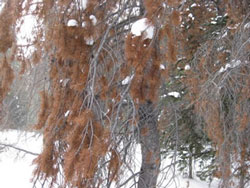 A nasty little beetle is destroying millions of acres of lodgepole pine trees across the western United States and so far, no one has been able to stop it.
A nasty little beetle is destroying millions of acres of lodgepole pine trees across the western United States and so far, no one has been able to stop it.
But, in the tradition of making lemonade from lemons, the biofuels industry has been working on ways to use the dead trees for energy – and one company is now claiming success.
Cobalt Technologies of California is claiming to be the first to produce biobutanol from beetle-killed lodgepole pine feedstock. To evaluate the fuel’s viability for commercial vehicles, the company has signed a fuel testing partnership with Colorado State University.
 “With this breakthrough, we’ve been able to turn a problem into an opportunity,” said Rick Wilson, Ph.D., chief executive officer of Cobalt Technologies. “Harvesting beetle-killed trees could produce low-carbon fuels and chemicals, establish a foundation for a sustainable biorefinery industry and create jobs, particularly in rural areas. If we use only half of the 2.3 million acres currently affected in Colorado alone, we could produce over two billion gallons of biobutanol — enough to blend into all the gasoline used in Colorado for six years.”
“With this breakthrough, we’ve been able to turn a problem into an opportunity,” said Rick Wilson, Ph.D., chief executive officer of Cobalt Technologies. “Harvesting beetle-killed trees could produce low-carbon fuels and chemicals, establish a foundation for a sustainable biorefinery industry and create jobs, particularly in rural areas. If we use only half of the 2.3 million acres currently affected in Colorado alone, we could produce over two billion gallons of biobutanol — enough to blend into all the gasoline used in Colorado for six years.”
“Clearly, this is a significant achievement and a major step forward toward the production of cellulosic biofuels. Converting beetle-killed pine for biofuels is an extremely difficult process,” said Ken Reardon, professor of Chemical and Biological Engineering at Colorado State University. “If Cobalt can convert beetle-killed wood, it’s likely that the company can make biofuel from almost any cellulosic feedstock.”
Cobalt Technologies has partnered with Colorado State University to perform engine testing with a gasoline-butanol blend made with the biobutanol from beetle-killed wood. The fuel testing will be performed at Colorado State University’s renowned Engines and Energy Conversion Laboratory under the auspices of the University’s Sustainable Bioenergy Development Center.

